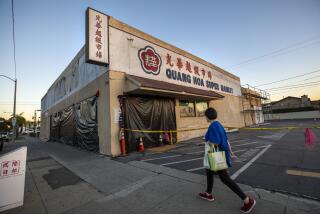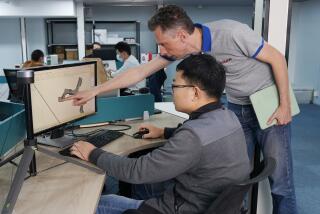U.S. Firms Adapting to Global Tumult
- Share via
U.S. executives battered by the global turmoil of the last two years are making adjustments to their operations that could alter the way they do business long after current threats subside.
The moves include everything from cutbacks in travel to greater use of technology for communications to an increased reliance on local staff or brokers to handle international transactions.
The tumult of the last two years -- the Sept. 11 terrorist attacks, the 10-day port shutdown on the West Coast, the war in Iraq and the spread of severe acute respiratory syndrome, or SARS -- is causing businesses around the world to examine their global vulnerabilities. The risks are intensified because insurers have balked at covering occurrences such as SARS that have had a crippling effect on some industries, particularly tourism.
Travel in Asia has plummeted since the outbreak of SARS has sickened nearly 3,500 people and killed 170. Hong Kong-based Cathay Pacific Airways said it may have to ground its fleet if passenger traffic doesn’t improve.
Lingering uncertainties and fear of another terrorist attack may keep a damper on corporate travel, said Dexter Coehl, spokesman for the Travel Industry Assn. of America in Washington. “It’s going to be a different world,” he said.
It could be a better world for PlaceWare Inc., a Mountain View, Calif., Web conferencing firmthat said it has experienced a 30% increase in business since SARS became headline news last month. Dustin Grosse, vice president of global marketing, said most callers have made urgent requests to set up sales meetings or training seminars with Asian participants that couldn’t be done in person because of health concerns.
Grosse predicts that many of those customers will become hooked on Web conferencing once they discover its ease and cost savings. Last year, the company, which is being acquired by Microsoft Corp., conducted 5 million hours of Web conferencing. Grosse said Honeywell International estimated it saved $10 million in travel costs in the first six months after it began using the PlaceWare system, which utilizes the Internet and phone connections.
“We did see a big uptick after 9/11, and we wondered if people would pull back afterward,” he said. “It hasn’t happened.”
Globe-trotting executives such as Rick Darling, president of Li & Fung USA, the U.S. arm of the Hong Kong-based trading firm, agree that there may be greater use of technology that was ignored when air travel was less intimidating.
Shortly after the SARS outbreak forced him to cancel his firm’s travel to Asia, he installed a teleconferencing center in his San Francisco office. It was used the first day it opened, and two similar centers in his New York office have been busy for weeks.
He said the U.S. apparel industry, which represents 70% of his business, has discovered that it can check samples, compare colors and select fabrics via the Internet or teleconferences. By reducing business travel from four trips to two a year, companies can save tens of thousands of dollars per employee, he said.
William Xin and Jeremy Haft, co-founders of BChinaB Inc., a New York trading firm focused on light industrial goods, are hearing from customers who have canceled buying trips to China because of SARS. Thousands of exhibitors and buyers called off visits to the Guangzhou Trade Fair, which opened this week to sparse crowds.
SARS isn’t the only problem facing BChinaB’s customers, which are mostly wholesalers or original equipment manufacturers. Anti-terrorism measures also have increased the difficulty of getting goods to the United States. The company fills orders from a network of 1,500 suppliers, mostly in the greater Shanghai area, and has 20 quality assurance engineers who oversee production and shipping.
“SARS gives people the feeling that they shouldn’t go to China, but they still want to do business there,” Xin said. “We manage all the complexities on the ground.”
SARS hit giant Wal-Mart Stores Inc. in the midst of a campaign to eliminate the middleman from its supply chain and handle more of its global sourcing directly, particularly from China. After the illness surfaced, the Bentonville, Ark.-based retailer put a hold on unnecessary travel to the most heavily affected regions and asked visitors from those countries not to visit its offices for at least 10 days after arriving in the U.S.
One Wal-Mart employee in a store in Shenzhen, China, was diagnosed with SARS last week and was hospitalized. The company said it has quarantined some employees in that store and has posted information alerting customers to the discovery. So far, it has not seen any negative effect on sales in China.
Wal-Mart has stepped up the use of teleconferencing and the Internet and is exploring other options for keeping its global operations running from afar, some of which could become permanent if they are cost-effective.
For U.S. technology firms, the SARS scare has highlighted the risks of becoming too dependent on one region. China, the epicenter of the SARS outbreak, is a leading producer of light industrial goods and computer components and one of the fastest-growing markets for high-tech products.
Earlier this week, Novellus Systems Inc., the San Jose-based maker of microchip production tools, warned that orders could drop sharply because of widespread concern about the respiratory illness. In its recent filing to sell shares to the public, Netgear Inc., a Santa Clara, Calif., networking company, warned potential investors that the spread of the disease might cause manufacturing disruptions and reduced sales.
“You’re subject to lots of shocks that are hard to anticipate in the global economy and therefore you have to have options,” said Barry Bosworth, an economist at the Brookings Institution in Washington. “This is about the dangers of excessive concentration.”
More to Read
Inside the business of entertainment
The Wide Shot brings you news, analysis and insights on everything from streaming wars to production — and what it all means for the future.
You may occasionally receive promotional content from the Los Angeles Times.










